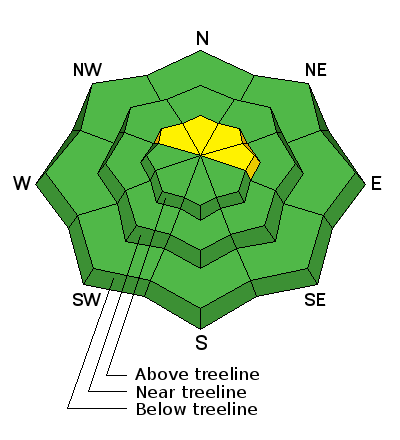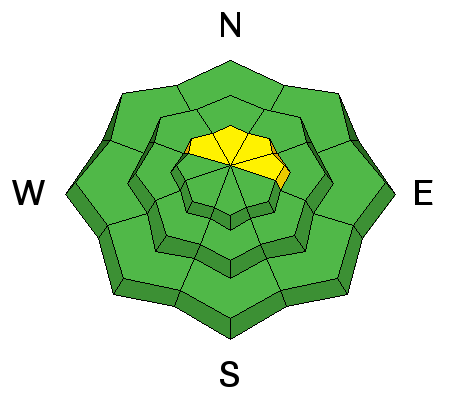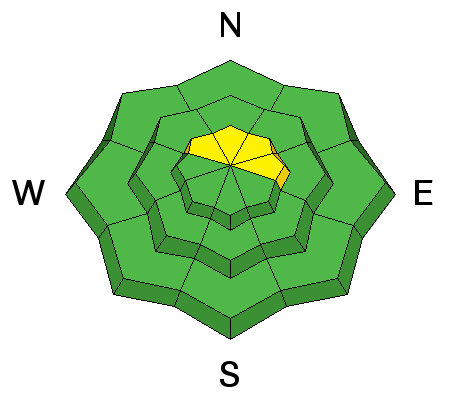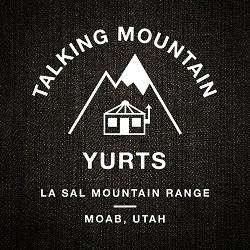Forecast for the Moab Area Mountains

Saturday morning, November 28, 2015
The avalanche danger is generally LOW at this time. There is an isolated or MODERATE danger for triggering a stiff wind slab primarily in steep, north facing terrain underneath cliff bands or on the lees sides of terrain features well below ridge crests. There also remains an isolated, or MODERATE danger for triggering a persistent slab on slopes steeper than 35 degrees with a NW-N-E aspect in areas that have more radical and rocky terrain.

 Weather and Snow
Weather and Snow
The mountains picked up a couple inches of snow last night, and though it won't amount to much in the way of powder conditions, at least things will look a bit better. Pre Laurel winds are unavailable until we get another part next week, but down on Abajo Peak, winds yesterday averaged in the mid 20's with gusts into the 40's from the SE. They dropped off around 6:00 p.m. last night into the single digits, gusting into the teens from the SW. It's a very frigid 4 degrees on Pre Laurel Peak, and 16 at the Geyser Pass Trailhead.
In general, the snow surface has been pretty worked over from the effects of wind, sun and warm temperatures. The new snow will most improve things where the underlying surface is smooth, or in sheltered areas where settled powder conditions still remained. Remember that it is still a shallow, early season snow pack and many obstacles such as stumps, rocks, and dead fall lurk beneath the surface.
Base depth in Gold Basin: 29"
Base depth at Geyser Pass Trailhead: 19"
Winds, temperature and humidity on Pre-Laurel Peak
New snow totals, temperature and humidity in Gold Basin
Total snow depth and temperature at Geyser Pass Trailhead
Wind Drifted Snow

Description
Moderate to strong winds from the SE have been pretty consistent over the past several days. There isn't a lot of loose snow available for transport, but there has been some snow blowing around. You may find stiff, isolated wind slabs on the lee sides of terrain features in exposed, more extreme terrain that has a NE-N-NW aspect. Due to the intensity of the winds, these deposits will be located further down the slope than usual. Suspect areas beneath rock bands. Mostly shallow, these shouldn't pose much of a problem, but they could knock you off your feet, or in some circumstances, take a step down into older, weak layers.
Persistent Weak Layer

Description
In may still be possible to trigger a persistent slab avalanche on a buried weak layer in the snowpack. Areas of rocky, steep terrain with a northerly aspect are the most suspect.
Additional Information
Unsettled weather conditions remain through the weekend with partly cloudy skies and occasional chances for snow showers. High pressure develops early in the week.
Today
Scattered snow showers, mainly before 10am. Partly sunny, with a high near 38. Southeast wind around 5 mph becoming southwest in the afternoon. Chance of precipitation is 30%.
Tonight
A 10 percent chance of snow showers. Mostly cloudy, with a low around 22. West northwest wind around 5 mph.
Sunday
A 20 percent chance of snow. Mostly cloudy, with a high near 36. Light west northwest wind becoming west 5 to 10 mph in the afternoon.
Sunday Night
A 20 percent chance of snow before 11pm. Mostly cloudy, with a low around 17. West wind around 5 mph.
Monday
Mostly sunny, with a high near 34. West wind around 5 mph.
Monday Night
Mostly clear, with a low around 15.
General Announcements
The Road to the Geyser Pass Trailhead is plowed but with patches of mud, ice and packed snow.
Thanks for sending in your observations. You can view Moab observations here. To post an observation go here.
To receive this advisory by email go here.
This information does not apply to developed ski areas or highways where avalanche control is normally done. This advisory is from the U.S.D.A. Forest Service, which is solely responsible for its content. This advisory describes general avalanche conditions and local variations always exist.



